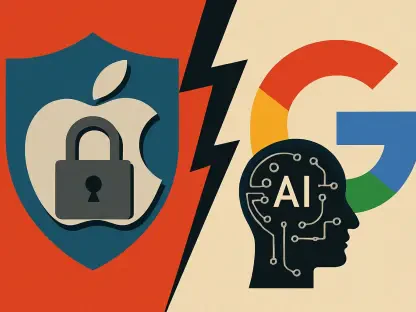Akash Network is emerging as a revolutionary force in the realm of cloud computing and artificial intelligence. By leveraging the principles of decentralization and blockchain technology, Akash offers a compelling alternative to the existing monopolistic cloud services provided by giants like AWS, Google Cloud, and Microsoft Azure. This transformative approach promises more affordable, scalable, and censorship-resistant cloud services, which could redefine the technological landscape.
The Cost Efficiency of Akash Network
One of the standout features of Akash Network is its cost efficiency. Traditional cloud services often come with high price tags, making it difficult for startups and smaller developers to access the necessary computing power. Akash addresses this issue by enabling users to rent out unused computing power at significantly lower costs.
This democratized approach not only makes cloud services more affordable but also ensures that valuable computing resources do not go to waste. As a result, Akash Network becomes an attractive option for those looking to minimize expenses while maximizing performance. The ability to access powerful infrastructure at a fraction of the cost can empower developers to innovate without the financial constraints typically associated with cloud computing.
Furthermore, the financial model of Akash Network is designed to be transparent and competitive. Pricing is dictated by market demand, which encourages fair competition and better service quality. For businesses and developers, this means more control over their computing costs and the ability to scale according to their specific needs without facing exorbitant fees.
AI and Blockchain: A Powerful Synergy
Akash Network brilliantly merges the capabilities of AI and blockchain technology. This integration allows for the training and deployment of AI models on a decentralized platform, providing a new level of flexibility and efficiency.
Developers can now leverage the distributed computing power of Akash Network to handle the intensive computational needs of AI without being bound to centralized providers. This can drive innovation in AI development, as it places high-performance computing within reach of a broader range of users. The combination of blockchain’s security features and AI’s innovative capacity creates an ecosystem where advanced AI solutions can be developed cost-effectively and securely.
Additionally, the synergy between AI and blockchain on Akash Network opens up new possibilities for decentralized AI applications. By leveraging blockchain’s decentralized nature, AI applications can operate in a trustless manner, ensuring data integrity and reducing the risk of single points of failure. This could lead to more robust and innovative AI solutions that are less dependent on centralized authorities.
The Role of the AKT Token
The AKT token lies at the heart of Akash Network’s economy. It facilitates transactions, staking, and governance within the ecosystem, ensuring that the network remains truly decentralized and community-driven.
Token holders have the power to influence the network’s future direction, making Akash a living, evolving platform that adapts to the needs of its users. This token-driven economy underscores the commitment to decentralization and active community participation. By holding and staking AKT tokens, users can participate in governance decisions, which include voting on protocol upgrades, resource allocation, and other crucial aspects of the network’s development.
The use of AKT tokens also ensures that the network operates seamlessly, with transactions within the ecosystem being facilitated quickly and efficiently. This provides a stable and consistent user experience, which is essential for developers relying on Akash for their cloud computing needs.
Scalable Infrastructure for Demanding Tasks
In the world of AI, scalability is crucial. Akash Network boasts a scalable infrastructure that can handle high-demand computing tasks, making it ideal for AI model training and large-scale data processing.
This scalability ensures that developers can access the resources they need as their projects grow, without experiencing performance bottlenecks or prohibitive costs. It’s a significant advantage in a field where computational needs can rapidly escalate. The flexible nature of Akash Network’s infrastructure allows users to scale their resources up or down based on their current requirements, providing a level of adaptability that is often lacking in traditional cloud computing models.
Moreover, scalability in Akash Network is not limited to computational resources alone. The network is designed to handle millions of transactions and multiple users simultaneously, ensuring that performance remains consistent regardless of the load. This reliability is essential for AI development where large datasets and extensive processing power are required.
Security in Decentralization
Data security and privacy are paramount concerns in cloud computing. The decentralized nature of Akash Network minimizes the risks associated with data breaches and censorship, as there is no single point of failure or control.
By distributing computing tasks across multiple nodes, Akash enhances the security of sensitive data and gives users greater peace of mind. This feature is particularly valuable for applications that handle critical or confidential information. With decentralization, data is not stored in a single location, making it significantly harder for malicious entities to target and compromise sensitive information.
Another key aspect of Akash Network’s security model is its use of blockchain technology, which provides immutable and transparent records of all transactions. This ensures that any alterations or unauthorized access can be detected and addressed promptly. The robust security measures inherent in Akash Network make it an ideal solution for industries requiring high levels of data protection and compliance.
Addressing the Cloud Monopoly
The current cloud computing landscape is dominated by a few major players who control access and pricing. Akash Network breaks this monopoly by offering a decentralized marketplace for cloud services, fostering a more competitive and open market.
This disruption can lead to greater innovation and more equitable access to computing resources, benefiting developers and businesses alike. Akash empowers users to choose from a diverse pool of providers, ensuring better service and pricing. By decentralizing cloud computing, Akash Network encourages competition, which can drive down prices and improve service quality across the industry.
Additionally, breaking the monopoly of traditional cloud providers can spur technological advancements as smaller players are given the opportunity to innovate. This could lead to a more dynamic and diverse cloud computing ecosystem, where new ideas and solutions can flourish.
Practical Applications for AI
Akash Network’s Supercloud initiative equips developers with high-performance GPUs like NVIDIA A100s and #00s, essential tools for AI training and big data tasks. This practical support makes advanced AI capabilities more accessible and affordable.
With Akash, even smaller AI startups and independent developers can compete with larger entities by leveraging cost-effective, high-performance computing power. It levels the playing field in AI development and deployment. Access to high-end GPUs and a decentralized computing infrastructure means that developers no longer have to compromise on quality or performance to stay within budget.
Moreover, Akash Network supports a wide range of AI and ML frameworks, providing developers with the flexibility to choose the tools that best suit their projects. This compatibility further enhances Akash Network’s appeal to the AI development community, positioning it as a go-to platform for innovative AI solutions.
Competitive Advantage in AI and Blockchain
In the crowded landscape of AI-related blockchain projects, Akash differentiates itself by focusing on the compute layer essential for AI tasks. This specialization gives it a competitive edge over projects with a broader or less defined focus.
By addressing the specific needs of AI developers and providing the infrastructure they require, Akash consolidates its position as a pivotal player in the intersection of AI and blockchain. The focus on delivering high-performance computing resources positions Akash Network as a critical enabler of AI innovation, setting it apart from other blockchain projects that may lack this specialized focus.
This expertise in the computational layer also allows Akash Network to form strategic partnerships with leading AI organizations and projects. These collaborations can enhance the network’s capabilities and provide users with access to the latest advancements in AI technology.
Sustainable Investment Potential
The AKT token’s market performance is driven by actual demand for decentralized computing, providing a more stable investment compared to speculative crypto assets. As more developers adopt Akash, its real-world usage and adoption underpin its value.
The growing demand for AI and cloud services bodes well for Akash Network’s future, attracting institutional interest and driving revenue growth. This solidifies its potential as a sustainable investment. Unlike many cryptocurrency projects that rely heavily on market speculation, Akash Network’s value proposition is rooted in its tangible utility in cloud computing and AI development.
Institutional investors have begun to recognize Akash Network’s potential and are increasingly considering it as a viable investment opportunity. The combination of real-world application, market demand, and a clear value proposition makes Akash Network an attractive option for investors looking to diversify their portfolios.
Overcoming Challenges
Despite its innovative approach, Akash Network faces competition from well-established cloud providers. The giants of the industry have significant resources and market influence, which can pose challenges to Akash’s growth aspirations.
Furthermore, the regulatory landscape for decentralized cloud computing remains uncertain. Legal and compliance hurdles could impact operations, necessitating careful navigation and adaptation to evolving regulations. Akash Network must remain vigilant and proactive in addressing these challenges to sustain its growth and adoption.
In addition to regulatory challenges, attracting and retaining a critical mass of users is essential for Akash Network’s long-term success. Continuous innovation, user engagement, and community support will be crucial in maintaining momentum and ensuring the network remains a relevant player in the cloud computing market.
Navigating Cryptocurrency Volatility
As with all cryptocurrencies, AKT is subject to market volatility, which can affect its value. Investors must be mindful of the inherent risks associated with the crypto market, including price swings and market sentiment shifts.
However, the intrinsic value of AKT, driven by real-world use cases and demand for decentralized computing, provides a buffer against extreme volatility. While no investment is without risk, Akash Network’s strong value proposition and tangible utility make it a more resilient option compared to purely speculative assets.
Moreover, ongoing adoption and integration of AKT within the Akash Network ecosystem can help stabilize its market performance over time. The continuous development of the network and its ability to adapt to changing market conditions will play a critical role in navigating the inherent volatility of the cryptocurrency space.
Conclusion
Akash Network is positioning itself as a revolutionary player in the cloud computing and artificial intelligence landscape. By harnessing the power of decentralization coupled with blockchain technology, Akash offers a compelling alternative to traditional cloud service providers like AWS, Google Cloud, and Microsoft Azure. Unlike these tech giants who dominate the market, Akash’s model aims to offer cloud services that are more affordable, scalable, and resistant to censorship.
With its decentralized infrastructure, Akash Network allows for greater flexibility and adaptability, making it an attractive option for businesses seeking to reduce costs while enhancing security and performance. The platform’s commitment to decentralization ensures that data is distributed across multiple nodes, reducing the risk of outages and enhancing data privacy. Moreover, by leveraging blockchain, Akash introduces an unprecedented level of transparency and trust, which are increasingly crucial in today’s digital age.
This innovative approach not only challenges the status quo but also promises to reshape the technological landscape. As more organizations look for alternatives to traditional cloud services, Akash Network stands at the forefront of this shift, advocating for a more open, efficient, and democratic cloud computing future. By doing so, Akash has the potential to significantly alter how cloud services are consumed and provided, making it a notable player to watch in the coming years.









